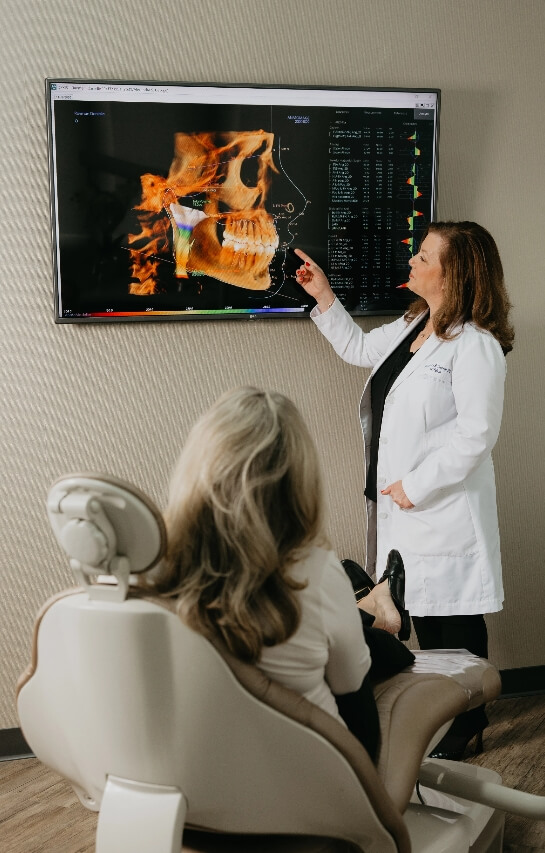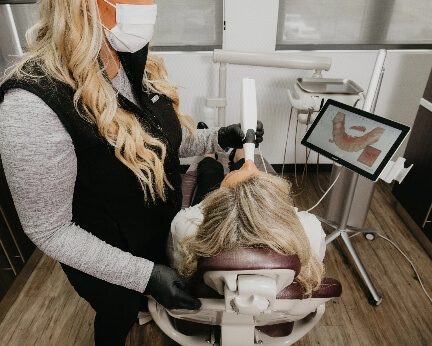
The temporomandibular joint is what connects your jaw to the temporal bones in your skull, facilitating movement for talking, chewing, and yawning. When this crucial joint experiences dysfunction or disorder, it is known as TMJD. This condition can cause various discomforts, including jaw pain, difficulty chewing, aching around the ear, and even lockjaw. Millions of Americans deal with this pain, often unaware that these discomforts are linked to TMJD.
Dr. Alexandra S. George DDS specializes in diagnosing TMJD and identifying the underlying issues that trigger pain. We offer personalized TMJD treatment that improve your jaw’s functionality while alleviating and even eliminating your pain.
The true measure of our success is the happiness of our clients. Watch these stories to see how we’ve helped real people achieve life-changing results and the beautiful smiles they deserve.

TMJ/TMJD can be a source of chronic pain and discomfort. At Pittsburgh Dentist, we provide specialized care rooted in neuromuscular dentistry to accurately diagnose and treat the root cause of your symptoms. Our goal is to help you find lasting relief, restoring proper function and improving your overall quality of life.

The primary goal of TMJD treatment is to alleviate pain, restore normal jaw function, and improve the patient’s overall quality of life. The appropriate treatment is dependent on each patient’s unique condition and specific needs. Ultimately, a successful TMJD treatment approach is one that is individualized to the patient.
Learn More
Disclusion Time Reduction (DTR) Therapy is a method used to diagnose and treat issues related to the temporomandibular joint (TMJ) and bite misalignment. It uses technology to measure and record the precise amount of time it takes for your back teeth to disclude or separate when your jaw moves from a biting position to a resting position.
Learn More
TMJD typically presents various symptoms, including jaw pain, difficulty or discomfort while chewing, a clicking or popping sensation in the jaw, earache, facial pain, and even headaches. While TMJD might not be completely preventable, there are ways to reduce the risk and manage potential triggers.
Learn MoreLiving a pain-free life, unhindered by the discomforts of TMJD, is not a distant dream but an achievable reality with the specialized treatments from Dr. Alexandra S. George DDS. Our dedicated and empathetic TMJ specialist team, led by the award-winning Dr. Alex, is committed to restoring the harmony of your jaw function and improving your quality of life.
Through our comprehensive approach, we aim not only to alleviate your immediate symptoms but to address the root cause of your TMJD, ensuring long-lasting relief. By leveraging cutting-edge diagnostic tools, personalized treatment plans, and innovative therapeutic strategies, we turn your journey toward health into a reassuring, empowering experience.
While some TMJ issues can be resolved independently with time and self-care practices, many cases require professional treatment to alleviate pain and restore jaw function. A specialist should evaluate persistent or severe symptoms.
TMJ issues can be caused by a variety of factors, including jaw injury, arthritis, excessive gum chewing, stress, and bite misalignment. Identifying the underlying cause is crucial for effective treatment.
Yes, TMJ issues can impact dental health by causing wear and tear on the teeth, leading to bite misalignment, increased tooth sensitivity, and even tooth damage.
Yes, there is a link between TMJ and headaches. TMJD can cause tension headaches due to the strain on the muscles around the jaw and face, often presenting as pain around the temples or earaches.
Our diagnostic tests for TMJ start with a consultation with X-rays and photographs, where a lot of information will be provided, and your dental history will be reviewed. We use CBCT to evaluate the joint and utilize our computer technology, the K-7, and bioPAK to read EMGs to evaluate the muscles.
TMJ issues can have a hereditary component, making some individuals more predisposed to TMJD due to genetic factors related to jaw structure or other related health conditions.
If you have TMJ issues, avoiding hard, chewy, or sticky foods that require excessive chewing or a wide-opening mouth opening is best. Opting for softer foods can help minimize strain on the jaw.